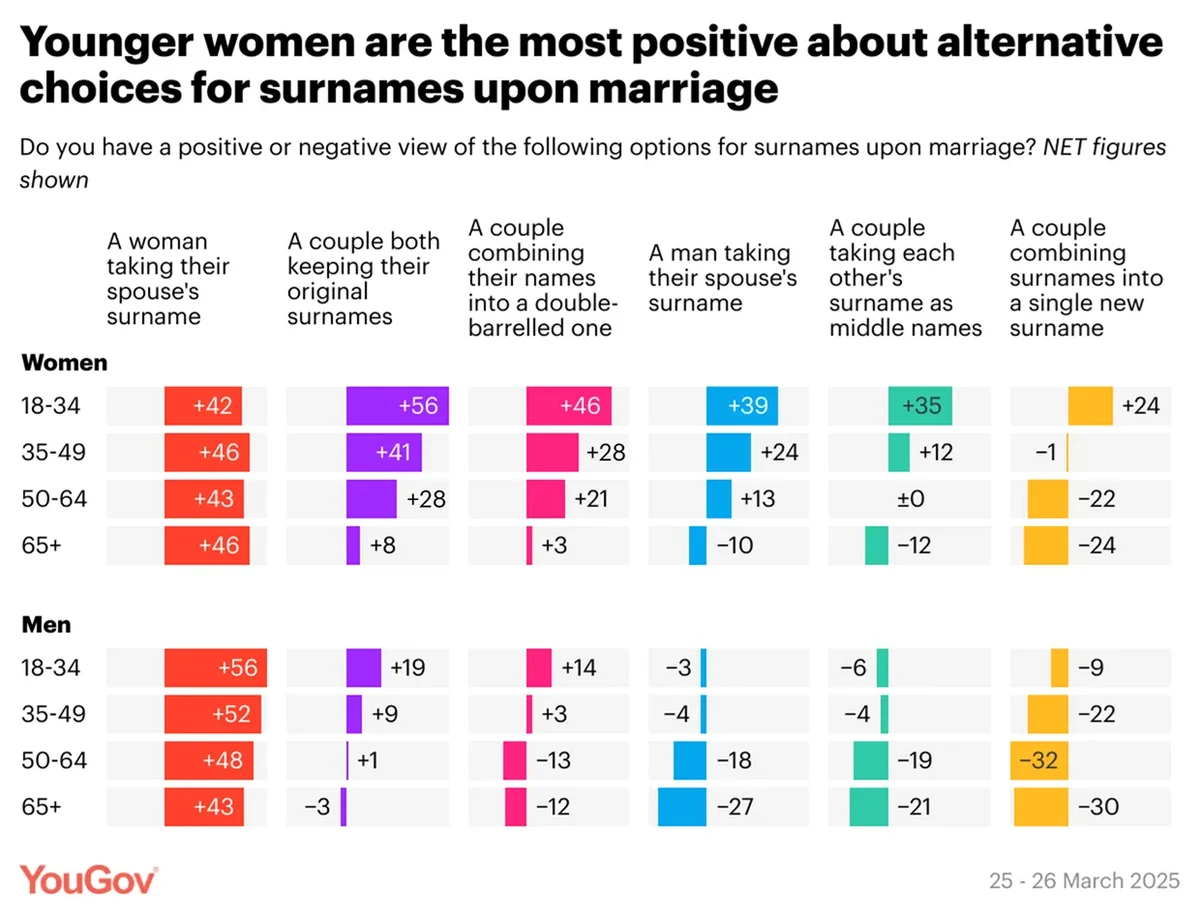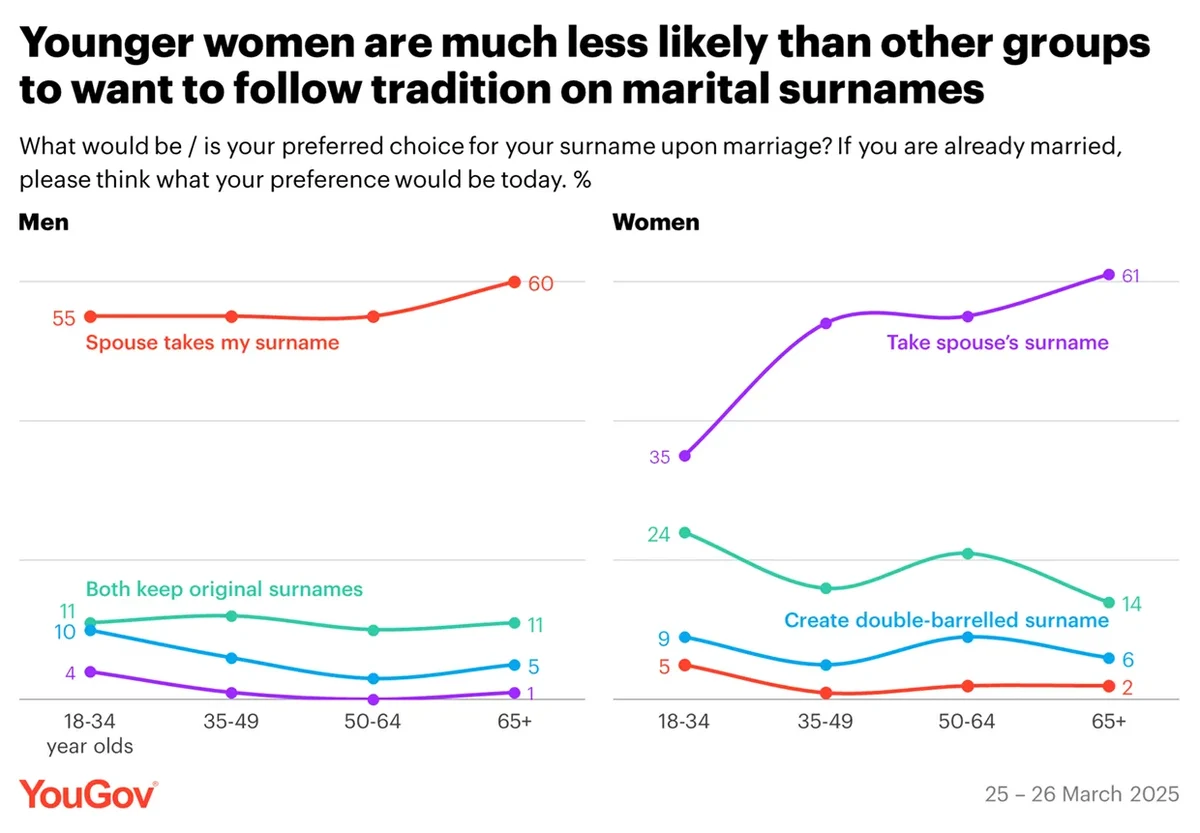Women taking their spouse’s surnames remains the most popular option for choosing married names, but alternatives are most popular among younger women
Traditionally in Britain, marriage saw a woman taking her husband’s surname, but today it’s not guaranteed. A range of alternative options are now available to couples, but have they gained acceptance among Britons?
By a clear margin, a woman taking their spouse’s surname when they get married is the most positively viewed option for a couple, with a majority of Britons (53%) seeing the practice as a positive, alongside four in ten (41%) having no feelings on the matter either way. Just 5% of Britons have a negative view of the tradition.
A man taking their spouse’s surname is less popular, with only around a quarter of Britons (27%) having a positive view of the role reversal, though nearly half (47%) feel neither positively nor negatively towards it, leaving just 25% of Britons who have an outright negative view of a man taking his wife’s name.
There is similarly only minority dislike for a couple both keeping their original surnames, with just 16% having a wholly negative view, compared to 36% having a positive view and 46% being effectively neutral.
An alternative to deciding whose name to keep is to create a new surname. Doing this by double-barrelling is seen favourably by 34% of Britons and neutrally by 42%, while 22% see it negatively.
By contrast, name blending, whereby couples combine their surnames into a single new name, excites the most dislike of any of the six options polled, with 36% of Britons seeing the option in an unfavourable light. This does though compare to 22% being positive about it and 37% having no strong feelings.
An alternative to double-barrelling is couples taking each other’s surnames as middle names, while retaining their original surnames. This, though, is seen less positively than either keeping original surnames by themselves or traditional double-barrelling, with only a quarter of Britons (24%) seeing it positively, though alongside 45% who are neither positive nor negative about it.
How do attitudes to marital surnames differ by generation and gender?
But this lower level of enthusiasm for alternative options for married surnames is not shared by all groups, with younger women having notably more positive views of non-traditional approaches. Indeed, 18-34 year old women are the only group who are more likely to see all six polled options positively than negatively, as well as the only group where a woman taking their spouse’s surname was not the most positively viewed.
Older women, by contrast, are less supportive of deviations from tradition, with no more than 27% of women aged 65 and over feeling positive about any of the options other than a woman taking their spouse’s surname, which 50% of are positive towards. This contrasts with 47% of 18-34 year old women being positive about merging surnames, the least popular option among that group.
Younger men do tend to have a more favourable view of alternative options than older men: for instance, 29% of 18-34 year old men feel positively about a man taking their spouse’s surname, relative to 8% of over 65 men. However, this is matched by 32% of 18-34 year old men having a negative view of it, and young men are also more likely than older men (60% vs 46%) to have an explicitly positive view of a woman taking their spouse’s surname.

Which married surname option would Britons choose themselves?
Ultimately, though, a couple can only pick one option, and the traditional route does remain the norm, with 56% of men saying they would want their spouse to take their surname and 51% of women willing to take their spouse’s name.
But women are more likely to want both to keep their original surnames, with 19% of women favouring this option, compared to 11% of men. Only 7% of Britons would choose to create a double-barrelled surname, with no more than 1-2% of men or women willing to go for any of the other alternatives.
Again, though, younger women are the most receptive to alternatives. While 55-60% of all age groups of men would prefer for their spouse to take their name and 54-61% of over 35 age groups of women are happy to take their spouse’s surname, just 35% of 18-34 year old women would choose to adhere to the tradition.
A quarter of younger women (24%) would instead rather that both kept their original surname, roughly double the 11% of 18-34 year old men who would favour that option. However, younger men and women are the most likely to favour alternatives, with 17% of men and 20% women aged 18-34 favouring options such as double-barrelled names, merging surnames or a man taking their spouse’s surname.

Would you take your spouse’s surname? How do you feel about marriage in general, and everything else? Have your say, join the YouGov panel, and get paid to share your thoughts. Sign up here.
Photo: Getty










